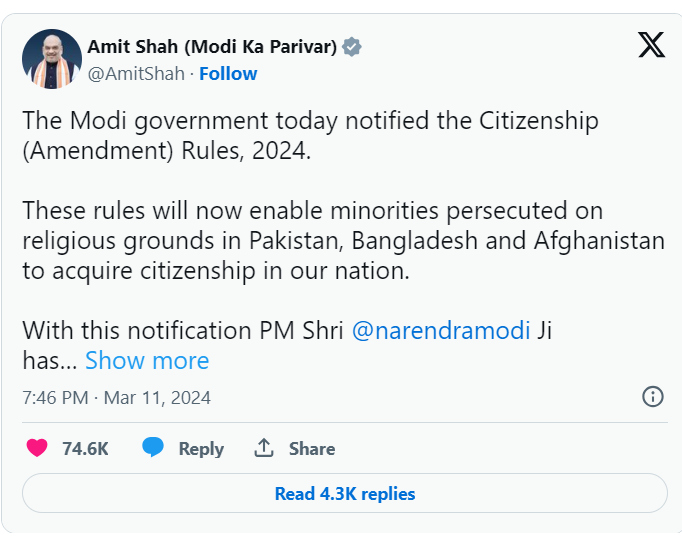
The Citizenship Amendment Act (CAA) was officially implemented today, March 11, 2024. This enactment follows approximately four years after the Indian Parliament passed the Citizenship Amendment Bill in 2019, which subsequently received the President’s assent. The Prime Minister formally announced the commencement of the CAA law during a press conference.
The Modi government has put the Citizenship Amendment Act CAA into effect, marking a significant move ahead of the Lok Sabha elections. This decision has met with criticism from opposition parties, but it has also sparked celebrations in some quarters. Notably, in West Bengal, the state governed by Mamata Banerjee, people are celebrating the implementation of the CAA.
Members of the Matua community in West Bengal have described the implementation of the Citizenship Amendment Act CAA by the Narendra Modi government as their “second Independence Day.” The act, which was put into effect on Monday, has elicited reactions from across the country. In West Bengal, the mood among the people is distinctly charged .
The Citizenship Amendment Act CAA enables minorities from Hindu, Sikh, Jain, Buddhist, Parsi, and Christian communities originating from Pakistan, Bangladesh, and Afghanistan to acquire Indian citizenship.
What is the Citizenship Amendment Act (CAA)?
The Citizenship Amendment Bill modifies the Citizenship Act of 1955 to grant citizenship eligibility to Hindu, Sikh, Buddhist, Jain, Parsi, and Christian illegal migrants from Afghanistan, Bangladesh, and Pakistan.

The Citizenship Amendment Bill was proposed in the Lok Sabha on 9 December 2019. The House passed the bill on 9 December 2019. The Rajya Sabha passed the bill on December 11, 2019.
What are the provisions in the new CAA law?
The Citizenship Act allows for the acquisition of Indian citizenship through naturalization. To be eligible, individuals must have entered India on or before December 31, 2014. Currently, citizenship is granted to those born in India or individuals who have lived in the country for a minimum of 11 years.
The legislation reduces the residency requirement for naturalization from 11 years to 6 years for individuals from six religious communities Hindu, Sikh, Jain, Buddhist, Parsi, and Christian and three countries Afghanistan, Bangladesh, and Pakistan.
The law also provides that registering Overseas Citizen of India (OCI) cardholders can be cancelled if any rule is violated.
What are the main features of the law?
The Citizenship Act of 1955 establishes the criteria for acquiring Indian citizenship. A person can obtain Indian citizenship if they were born in India, if their parents are Indian, or if they have resided in the country for a certain period, among other conditions.
Nonetheless, illegal migrants are not eligible to acquire Indian citizenship. An illegal migrant is defined as a foreigner who either (i) enters the country without valid travel documents like passports and visas, or (ii) enters legally but overstays the duration allowed by their visa.
Foreigners found to be in India illegally may face imprisonment or deportation according to the Foreigners Act of 1946 and the Passport Entry into India Act of 1920. These acts authorize the central government to oversee the entry, departure, and residency of non-citizens in India.
In 2015 and 2016, the central government released notifications that exempted specific categories of illegal migrants from the regulations of the 1946 and 1920 Acts. These exemptions apply to Hindus, Sikhs, Buddhists, Jains, Parsis, and Christians from Afghanistan, Bangladesh, and Pakistan who entered India on or before December 31, 2014. As a result, individuals from these groups are not subject to deportation.
What will happen after CAA Implementation?
The Citizenship Amendment Act (CAA) is a law designed to grant citizenship to refugees from three neighboring countries who have fled religious persecution. There are numerous misunderstandings about the CAA. It is important to note that this law is intended to confer citizenship, not revoke it. The CAA does not strip any Indian citizen of their citizenship, regardless of their religion. This Act specifically aims to assist those who have endured years of persecution and consider India their only refuge.
The rollout of the Citizenship Amendment Act was postponed because of the Corona pandemic, but it has since been implemented. In their 2019 Lok Sabha election manifesto, the BJP pledged to enact the Citizenship Amendment Bill to safeguard religious minorities facing persecution in neighboring countries.
CAA Law: 10 big things you must know about Citizenship Amendment Act
The Union Home Ministry has announced the implementation of the Citizenship Amendment Act 2019, also known as the CAA. This notification paves the way for non-Muslim refugees from Pakistan, Bangladesh, and Afghanistan to acquire Indian citizenship. Here are ten important aspects to know about this development.
1. CAA stands for the Citizenship Amendment Act. This law provides a pathway to citizenship for six religious minority groups—Hindus, Sikhs, Buddhists, Jains, Parsis, and Christians—who arrived in India from three neighboring countries, Pakistan, Bangladesh, and Afghanistan, before December 2014.
2. The Union Home Ministry published the notification for the Citizenship (Amendment) Act 2019 on March 11, 2024, ahead of the Lok Sabha elections. The regulations under the CAA are designed to provide Indian citizenship to non-Muslim migrants, such as Hindus, Sikhs, Jains, Buddhists, Parsis, and Christians.
3. Indian citizenship will be granted only to individuals who sought refuge in India from Bangladesh, Pakistan, and Afghanistan before December 31, 2014. Only migrants from these three countries are eligible to apply for citizenship.
4. The Citizenship Amendment Bill (CAB) was approved by Parliament in December 2019 and subsequently became law after receiving the President’s endorsement. Following its ratification, the Citizenship Amendment Act (CAA) sparked protests in various states.
5. The regulations for the CAA are now established, and the entire application process is conducted online. Applicants will not need to submit any additional documents. They must, however, specify their date of arrival in India as part of the online application.
6. Over the past two years, more than 30 District Magistrates and Home Secretaries across nine states have been authorized to confer Indian citizenship, under the Citizenship Act of 1955, to Hindus, Sikhs, Buddhists, Jains, Parsis, and Christians from Afghanistan, Bangladesh, and Pakistan.
7. The 2021 Annual Report from the Ministry of Home Affairs indicates that 1,414 individuals from non-Muslim minority groups who arrived from Pakistan, Bangladesh, and Afghanistan between April 1, 2021, and December 31, 2021, were awarded Indian citizenship. This was achieved through either registration or naturalization, as per the provisions of the Citizenship Act 1955.
8. The Citizenship (Amendment) Act 2019 does not affect the citizenship status of existing Indian citizens. Indian nationals possess the right to citizenship as granted by the Constitution, and the CAA does not have the authority to revoke anyone’s Indian citizenship .
9. Home Minister Amit Shah presented the Citizenship (Amendment) Act 2019 (CAA) in the Lok Sabha on December 9. The CAA was approved by Parliament on December 11, 2019, with 125 votes in favor and 105 against. The President gave his assent to the legislation on December 12, 2019.
10. The Citizenship Amendment Bill 2016 (CAA) was introduced in 2016 as a proposed amendment to the 1955 citizenship law. The bill aimed to grant citizenship to non-Muslim refugees from three of India’s neighboring countries: Bangladesh, Pakistan, and Afghanistan. In August 2016, the bill was referred to the Joint Parliamentary Committee, which submitted its report on January 7, 2019.
